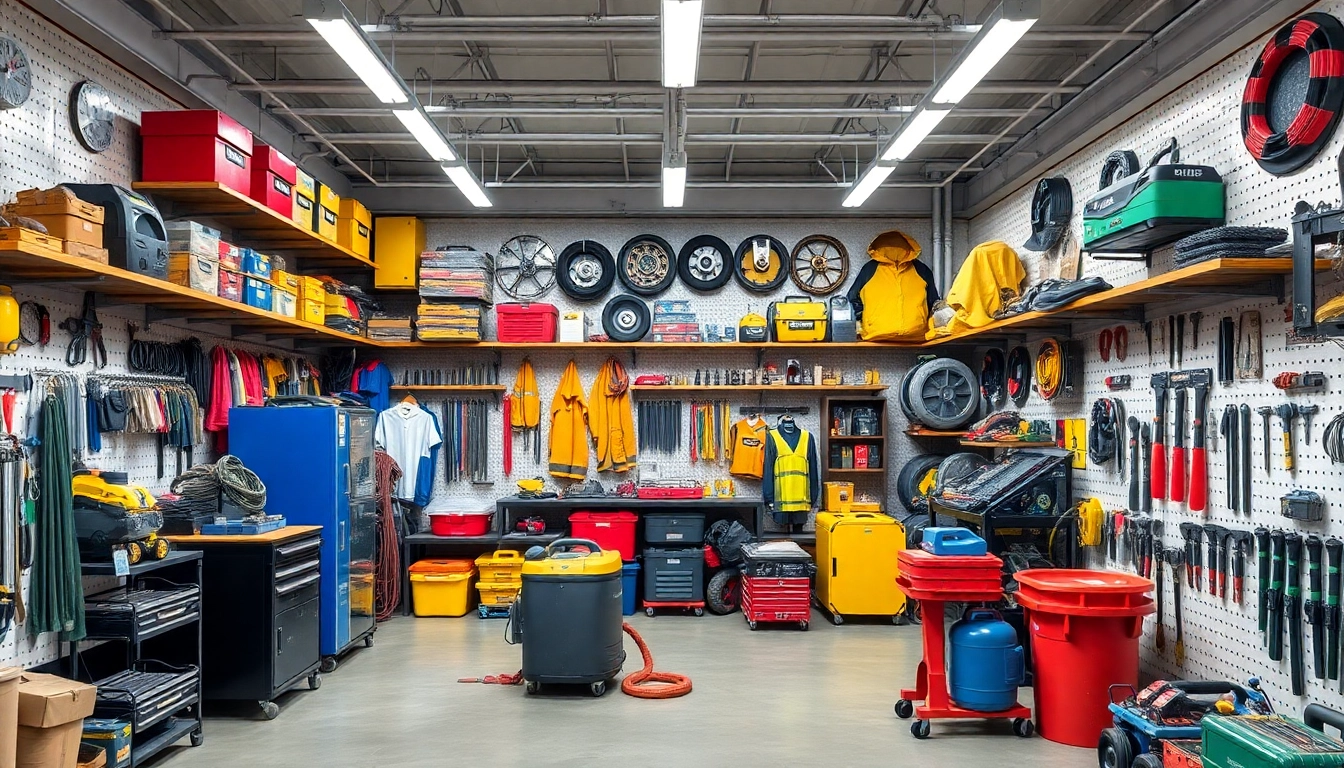Understanding Welding Supplies Near Me
Whether you’re a seasoned welder or a novice starting your DIY projects, the quest for suitable welding supplies is critical for achieving high-quality results. As the demand for welding services and projects grows, the importance of having accessible welding supplies nearby becomes increasingly evident. Searching for welding supplies near me is therefore significant for both efficiency and effective project execution. This article delves into the world of welding supplies, highlighting their diverse types, the importance of local availability, and how to identify the essentials for your next project.
What Are Welding Supplies?
Welding supplies refer to a broad array of materials, tools, and protective equipment essential for various welding processes. They generally include:
- Welders: The machines that fuse metals together using heat.
- Filler Materials: Used to join workpieces together, including rods, wires, and flakes.
- Shielding Gases: Protect welds from atmospheric contamination and improve quality.
- Welding Accessories: Includes clamps, tools, and personal protective equipment (PPE).
- Consumables: Items like welding tips and nozzles that need regular replacement.
The right supplies are crucial in ensuring weld integrity, durability, and safety during the process.
Importance of Local Availability
Having ready access to reliable welding supplies in your locality allows for greater flexibility in planning and execution. Here are several reasons why local availability is essential:
- Immediate Access: Local suppliers ensure you can quickly obtain necessary materials without waiting for shipping delays.
- Expert Consultation: Local stores often provide knowledgeable staff who can offer advice tailored to specific welding needs.
- Community Support: Purchasing from local businesses supports your community and may lead to better customer service.
Ultimately, local availability can enhance productivity and provide extra peace of mind when working on welding projects.
Types of Welding Supplies for Different Projects
Welding supplies are specialized based on the types of welding processes you may engage in, including MIG, TIG, and stick welding. Below is a breakdown of supplies tailored for different welding processes:
1. MIG Welding Supplies
MIG (Metal Inert Gas) welding is known for its speed and ease of use. Common supplies include:
- MIG Welder: Both gas and gasless welders are available.
- Wire Feed: Different diameters of wire for varying weld thickness.
- Contact Tips: Integral to the functioning of the MIG welder.
- Shielding Gas: Argon, CO2, or a mix depending on the material being welded.
2. TIG Welding Supplies
TIG (Tungsten Inert Gas) welding is precise and versatile. Supplies needed include:
- TIG Welder: Requires a high-quality machine for reliable performance.
- Tungsten Electrodes: Essential for creating the arc.
- Filler Rods: Available in different materials for various applications.
- Shielding Gas: Typically pure argon for the best possible welds.
3. Stick Welding Supplies
Stick welding, or SMAW (Shielded Metal Arc Welding), is straightforward and flexible. Related supplies include:
- Stick Welder: A compact machine for quick projects.
- Electrodes: Available in specialized coatings for different metals.
- Safety Equipment: Gloves, helmets, and aprons are essential.
Where to Find the Best Welding Supplies Near Me
Finding the best welding supplies involves knowing where to look. Below are effective strategies to find quality welding supplies.
Top Local Retailers for Welding Supplies
There are several reliable retailers well-known for their welding supplies. These include:
- The Home Depot: Offers a selected range of welding equipment and supplies that can often be picked up the same day.
- Lowes: Provides various welding machines and accessories, catering to both amateurs and professionals.
- Tractor Supply Co.: This retailer specializes in welding and offers both supplies and services.
- Ace Hardware: A convenient option for quick welding supplies, with many locations nationwide.
Online vs. In-Store Purchases
When considering sourcing welding supplies, it’s essential to compare the benefits of online purchasing with in-store shopping:
- Online Purchases: Provide convenience and often access to a broader inventory. Websites such as Amazon and specialized welding supply websites offer extensive options.
- In-Store Purchases: Allow for immediate acquisition of supplies. Furthermore, purchasing in-person gives the opportunity to ask questions and receive recommendations from knowledgeable staff.
Deciding between online and in-store options depends on personal preferences, urgency, and the need for expert advice.
Comparing Prices and Quality
When selecting where to shop, it’s significant to compare the prices and quality of welding supplies. Consider the following:
- Researching Vendors: It’s helpful to view multiple sources to see who has the best prices. Online reviews can provide insights into the quality of products as well.
- Identifying Brands: Recognizing reputable brands often correlates with high-quality supplies. Products from trusted manufacturers generally yield better results.
- Evaluate Return Policies: A good return policy is essential, especially when experimenting with new supplies.
Proper due diligence will ensure you find welding supplies that deliver both performance and value.
Essential Welding Tools and Equipment
In addition to the supplies themselves, specific tools and equipment are fundamental to ensuring successful welding projects. The following are vital components that every welder should acquire:
Welders: Types and Features
The functionality of welding depends significantly on the type of welder used. Below are common types of welders:
1. MIG Welders
MIG welders are favored for their speed and adaptability, making them suitable for a wide variety of materials, including steel and aluminum.
2. TIG Welders
TIG welders provide precision and are crucial for thinner materials or intricate work. Understanding how to adjust settings for different materials is essential.
3. Stick Welders
Often used in outdoor applications due to their versatility. These machines require fewer adjustments and are generally simpler to operate.
Protective Gear: Safety First!
Safety cannot be overstressed in welding. Essential protective gear includes:
- Welding Helmet: A shield designed to protect the eyes and face from the intense light and heat produced during welding.
- Welding Gloves: Heat-resistant gloves that provide protection against burn injuries.
- Protective Clothing: Flame-resistant jackets and pants help to avoid burns from sparks and molten metal.
- Respiratory Protection: In certain environments (for example, where metal fumes are prevalent), respirators are needed.
Investing in high-quality PPE is an investment in your health and safety on the job.
Consumables: What You Need
Consumables play a significant role in welding project success. Here are key consumables to keep on hand:
- Welding Rods/Wires: Different rods and wire types cater to various welding techniques and materials.
- Gas Cylinders: Essential for processes like MIG and TIG welding to provide shielding gas.
- Electrodes: These come in various classifications depending on the type of welding you are doing.
Maintaining an adequate stock of consumables ensures that projects can be carried out without unnecessary delays.
Tips for Choosing Welding Supplies
Selecting the right welding supplies can feel overwhelming with the vast array of options available. Here are effective tips to simplify your decision-making process:
Identifying Your Project Needs
Before purchasing supplies, clearly define the project parameters. Consider the following aspects:
- Material Type: Different types of metals require different welding techniques and supplies.
- Welding Technique: Whether you’re using MIG, TIG, or stick welding affects the type of supplies you require.
- Project Scale: Bigger projects may need larger or more specialized equipment and supplies.
Reading Customer Reviews
Customer reviews can provide valuable insights into the performance of welding supplies. Look for:
- Quality Assurance: Gather information about product reliability through feedback.
- Performance: Assess how products perform under different conditions, including heat and pressure.
- Durability: Understanding whether supplies hold up over time is crucial for long-term reliability.
Using customer reviews as a guide can help you make informed decisions based on actual user experiences.
Getting Expert Recommendations
Leverage the expertise of seasoned welders or professionals in your local supply stores. They can often provide:
- Brand Recommendations: Certain brands may have better reputations for specific applications.
- New Technologies: Awareness of the latest developments in welding technology can influence your choices.
- Project-Specific Advice: Tailored recommendations based on your specific project needs can lead to improved outcomes.
Don’t hesitate to ask questions—experts can greatly aid in the supply selection process.
Making the Most of Your Welding Supplies
Once you’ve acquired your welding supplies, understanding how to maximize their utility is essential. This section covers vital aspects of utilizing your supplies effectively:
Maintenance Tips for Tools and Equipment
Regular maintenance is essential to prolong the life of your welding equipment. Consider the following best practices:
- Regular Cleaning: Clean welders and tools after each use to remove debris and contaminants.
- Periodic Inspection: Check for wear and tear, replacing consumables and damaged parts promptly.
- Storage: Store equipment in a dry place to prevent rust and damage.
Implementing these practices can help maintain the performance and reliability of your supplies.
Safety Practices When Using Welding Supplies
Prioritizing safety when using welding supplies cannot be understated. The following practices can enhance workplace safety:
- Pre-Work Safety Checks: Examine all equipment and safety gear before beginning work.
- Safe Work Environment: Ensure the workspace is clean, well-ventilated, and free from flammable materials.
- Know Emergency Procedures: Familiarize yourself with emergency measures for equipment malfunctions or accidents.
Implementing stringent safety practices fosters a protective work environment.
Common Mistakes to Avoid
To ensure optimal results with your welding supplies, avoid the following mistakes:
- Choosing Incorrect Supplies: Using unsuitable materials can compromise join integrity.
- Neglecting Safety: Skipping on safety gear can lead to serious injuries.
- Ignoring Equipment Maintenance: Regular maintenance is key to preventing equipment failure.
Learning from others’ mistakes and practicing due diligence can lead to better outcomes in welding projects.



